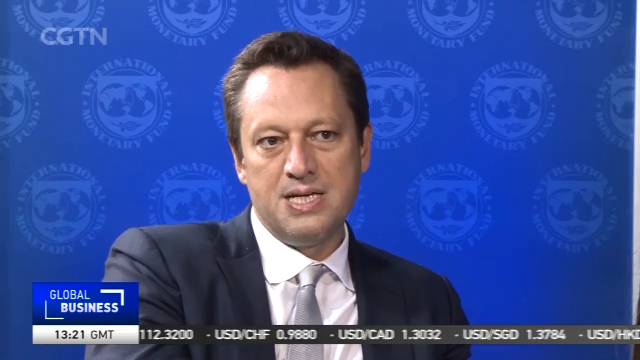
22:19, 11-Oct-2018
Global Financial Market: Interview with IMF Monetary & Capital Markets Dep't director
Updated
21:46, 14-Oct-2018
03:25

Our correspondent Cao Qingyun sat down in Bali with Tobias Adrian, a financial counsellor and director of the Monetary and Capital Markets Department of the International Monetary Fund to discuss the global financial system, trade tensions, and other issues.
CAO QINGYUN "Ten years after the Global Financial Crisis, is the financial environment safer than before? What are the biggest vulnerabilities?"
TOBIAS ADRIAN, DIRECTOR MONETARY AND CAPITAL MARKETS DEP'T, IMF "The financial system is safer today relatively to the banking sector. Banks have a lot more capitals and there are more liquidity and they are subject to resolution systems in most countries in the world, not in all the countries but in most countries where there are major global financial banks. So the financial system is safer and we also have more clearing derivatives in central counterparties, and the shadow banking system is safer in many parts of the world."
CAO QINGYUN "Trade tensions started by the US have been escalating. How will these tensions impact the global financial stability?"
TOBIAS ADRIAN, DIRECTOR MONETARY AND CAPITAL MARKETS DEPT., IMF "So the trade tensions generate uncertainties in investors. It's not clear how it's going to play out in the coming months. And we have seen some sectors in the U.S. particularly exposed to China and some sectors in the U.S. exposed to China. Those sectors have underperformed relatively to the broader market. So we do see some impact. Now the trade tensions have not yet the first impact on our baseline."
CAO QINGYUN "The Chinese government has been putting efforts to slow credit growth and reduce financial risks. What is your comment on those policies?"
TOBIAS ADRIAN, DIRECTOR MONETARY AND CAPITAL MARKETS DEPT., IMF "We welcome the regulatory tightening in China. We have been worried about the rapid increase in debt in the financial system but also among Chinese corporations. The built-up of leverage has slowed down. So the regulatory tightening that has started is welcomed because it's going to make the Chinese economy safer."
CAO QINGYUN "It has been 40 years since China began to open up and start economic reforms. What have been the biggest achievements and challenges in the reforms in China's monetary policy?"
TOBIAS ADRIAN, DIRECTOR MONETARY AND CAPITAL MARKETS DEPT., IMF "China is a huge success. We've seen the growth rate, the sustained positive high growth over the past decade are unprecedented historically in particular for a country of that size. China is deeply connected with the world economy, particularly via trade. The Impressive parts, just the general standard of living, it is very unusual and welcome. China has consistently contributed very positively to global growth in recent years."

SITEMAP
Copyright © 2018 CGTN. Beijing ICP prepared NO.16065310-3
Copyright © 2018 CGTN. Beijing ICP prepared NO.16065310-3